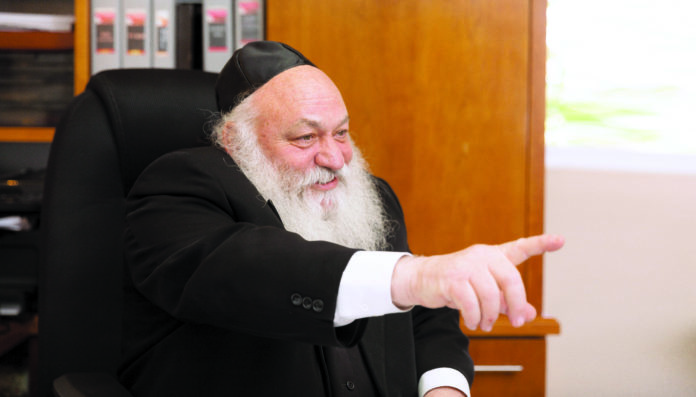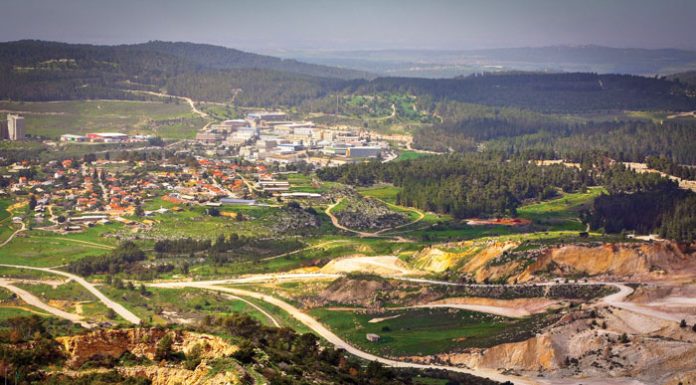After spending a considerable amount of time a few weeks ago in the Jerusalem office of Rabbi Yitzchok Goldknopf, the recent announcement that he was appointed to replace Rabbi Yaakov Litzman as chairman of Agudas Yisrael came to me as no surprise. In fact, after speaking with him about his various undertakings and recognizing his charismatic personality and skills, I pointedly asked him why he had never served in the Knesset on behalf of the Gur community. While he dismissively told me that he had no interest in politics, his deep involvement in community and national affairs strongly suggested otherwise. What I found particularly intriguing were his reminisces about how he had taken on El Al because of its desecration of Shabbos until he brought that mighty airline to its knees.
What follows is a political analysis of his appointment by Ami’s Chaim Friedlander, then my in-depth conversation with Rabbi Goldknopf.
An Analysis by Chaim Friedlander
Last Friday, the central faction within Agudas Yisrael that represents Ger published an official announcement stating that Rabbi Yitzchok Goldknopf has been appointed to serve as chairman of the Agudas Yisrael Party.
The announcement came in the wake of the resignation of the man who had served as chairman and represented Ger in the Knesset for the past 23 years, Rabbi Yaakov Litzman, a confidant of the Gerrer Rebbe for decades. Rabbi Litzman resigned from the Knesset as part of a plea bargain he signed with the State Prosecution, after an indictment was filed against him for allegedly attempting to influence the professional decision-making bodies within the Health Ministry.
He was replaced in the Knesset by MK Rabbi Yaakov Tessler of Vizhnitz, who had been in the eighth slot on the Yahadus HaTorah slate. Now with elections on the horizon, it was announced that Rabbi Goldknopf will replace Litzman as chairman.
Rabbi Goldknopf currently serves as the head of the Bais Yaakov kindergartens and has no political experience whatsoever. The reason why he will immediately serve as party chairman is that the division of power within Agudas Yisrael was set during the primary elections that took place in 1976, and the results remain binding to this day. In those primaries, the first place went to Ger. Second place went to Tzeirei Agudas Yisrael, which mainly represented the Litvish community. In third place was the Shlomei Emunim faction, which represented the Yerushalmi-general chasidic community, and in fourth place was the party of the “yotzei Romania,” which mainly represented Vizhnitz. In fifth place was a party that represented the Sefardi community.
Around a decade later, the Sefardi community established the Shas Party and movement, while the Litvish community established Degel HaTorah.
Since the elections of 1992, Agudas Yisrael and Degel HaTorah have run on a joint slate as Yahadus HaTorah. In 2019, they agreed that the slots would be apportioned on an alternating basis, with each faction taking turns to head the list. In the upcoming elections, the first position will go to Agudas Yisrael, which means that Rabbi Goldknopf will be first on the Yahadus HaTorah list.
The problem with this arrangement is that ever since the most recent municipal elections, during which Degel HaTorah ran separately from Agudas Yisrael, there have been mounting calls among the Litvish faction for the parties to do so in national elections as well. Among the chasidic factions, there are two opposing trends pushing toward a separate run, both of which have increased over the past few years. On the one hand, more chasidic communities have become ideologically opposed to voting in national elections. On the other hand, especially among smaller communities, and particularly among younger voters, there has been a tendency to more “nationalist” positions, which has led to the phenomenon of young chareidim voting for outspokenly right-wing parties.
Added to the mix is the argument that the arrangement between Degel and Agudah no longer reflects the relative strengths of the two communities.
The issue has been presented to Rav Edelstein, nasi of the Moetzes Gedolei HaTorah of Degel HaTorah, who has stated that he is opposed to the two factions running separately out of concern that Agudas Yisrael will not pass the electoral threshold, which is set at the high bar of 3.25 percent of the electorate.





















